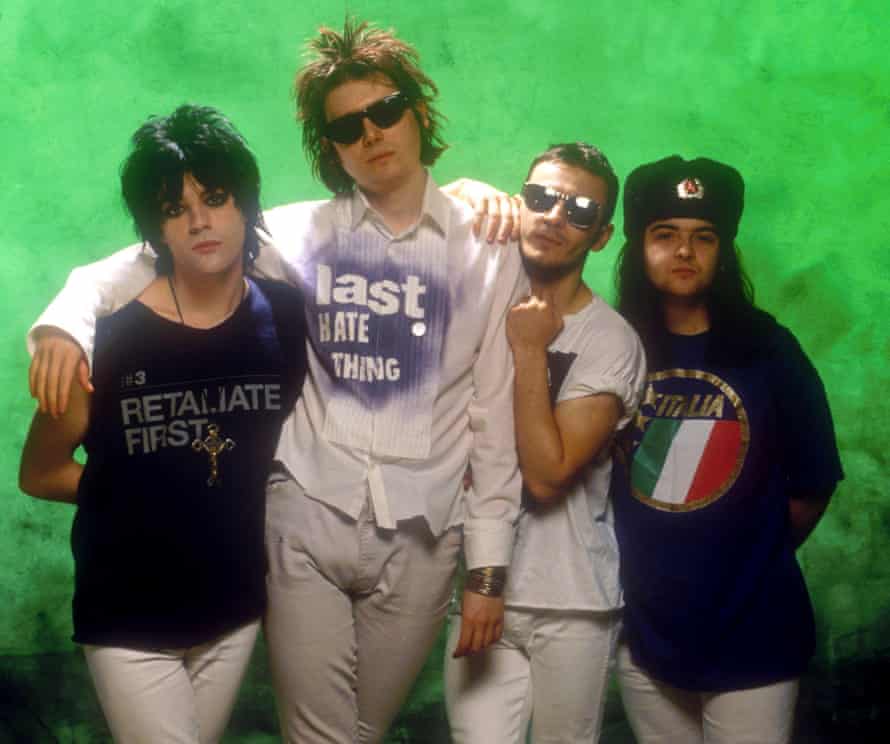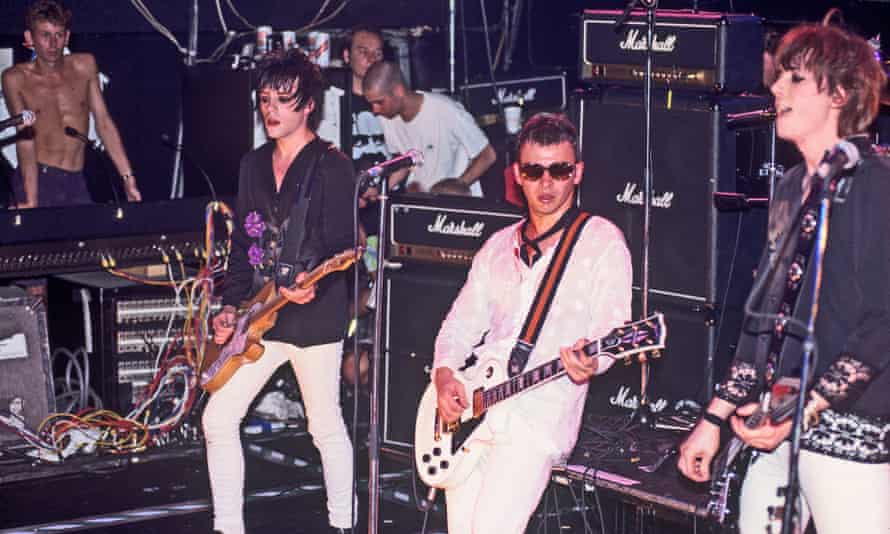Shared from Culture | The Guardian
30. A Billion Balconies Facing the Sun (2010)
Manic Street Preachers were always Guns N’ Roses fans: on A Billion Balconies Facing the Sun, they collaborated with the band’s bassist Duff McKagan. Charmingly perverse as ever, they turned in one of their poppiest latterday melodies, liberally decorated with metal guitar.
29. The Masses Against the Classes (2000)
The band’s conflicted attitude to mainstream acceptance is given full vent in this Chomsky and Camus-quoting blast of anger that alternately questions and celebrates their recent success in both lyrics and music. With a crowd-pleasing steal from Twist and Shout crashing against raw, dense punk rock, it entered the charts at No 1.
28. Sequels of Forgotten Wars (2018)
A band surveying a vastly altered musical landscape and wondering where – if anywhere – they fit in after 30 years: “There will be no parades for the likes of us … the callous deception of never giving up.” It is so self-interrogating, it answers its own central question: none of their peers would write something like this.
27. Comfort Comes (1994)
The Holy Bible’s oppressive racket appeared to come out of nowhere – unless you had noticed the B-side of Life Becoming a Landslide. It’s all there: a dark sound rooted in the angular guitars of post-punk years before the post-punk revival took hold, a claustrophobic atmosphere amplified by the effects that muffle and compress James Dean Bradfield’s voice during the verses; it breaks into a wounded roar at the chorus: lyrics that hint at anorexia and despair.
26. Divine Youth (2014)
Recent Manics albums have contained a lot of duets – testament to Bradfield’s acknowledgement that his own voice has limitations – but this, featuring Welsh singer-songwriter Georgia Ruth Williams, may be the best: an icy-sounding, echo-swathed but tender meditation on ageing.
25. La Tristessa Durera (Scream to a Sigh) (1993)
If you want to compare the Manics to the Clash – and the early Manics would clearly have been delighted if you did – then Gold Against the Soul is their Give ’Em Enough Rope: an overproduced second album that still contains a handful of potent songs, La Tristessa Durera’s sympathetic depiction of a war veteran among them.
24. Orwellian (2021)
Last year’s The Ultra Vivid Lament – a far more focused album than its predecessor, Resistance Is Futile – was heralded by Orwellian, a despairing survey of 21st-century British life that still feels weirdly uplifting thanks to its tune, which perfectly fulfils the band’s stated remit of “the Clash meets Abba”.
23. Enola / Alone (1996)
A song provoked by Nicky Wire looking at his wedding photos and seeing both Richey Edwards and the band’s late manager Philip Hall, Enola / Alone sums up Everything Must Go’s winning sound – melodically rich, “uplifting but melancholy” as Wire put it, plus Wire’s glum brand of post-Edwards positivity: “All I want to do is live, no matter how miserable it is.”
22. Judge Yr’self (1995)
Intended for Sylvester Stallone’s disastrous Judge Dredd movie, but rejected – perhaps understandably, given that Edwards’s minimal lyrics are clearly about self-harm – Judge Yr’self is the great lost Holy Bible-era Manics track: powerful, taut, relentless, punishing in a way that Mega City One’s chief law enforcer might appreciate. It eventually surfaced on the 2003 compilation Lipstick Traces.
21. Solitude Sometimes Is (2004)
Synthesiser-heavy, death-fixated, described by Nicky Wire as “a withdrawal”, 2004’s Lifeblood – a relative flop on release – has not been given the deluxe reissue treatment afforded most Manics albums. But it deserves reconsidering: beneath its smooth sheen lurk some fabulous songs, as evidenced by the utterly downcast loveliness of Solitude Sometimes Is.

20. Spectators of Suicide (1991)
At a time when the Manics seemed so anomalous to prevailing alt-rock trends that some observers concluded they must be a joke, this song, according to Martin Kelly of the band’s early label, Heavenly, “showed us, early doors, just how great this band were”. Subdued and subtle, the version on the B-side of You Love Us trumps the flat re-recording on their 1992 debut album, Generation Terrorists.
19. Rewind the Film (2013)
The title track of the (largely) acoustic album the Manic Street Preachers had been discussing making for 20 years is exquisitely lugubrious, making perfect use of guest Richard Hawley’s careworn vocals. The moment when Bradfield’s voice finally appears, backed by soaring strings, is really spectacular.
18. Archives of Pain (1994)
Shocking even 30 years ago, Archives of Pain is a song that’s almost impossible to imagine a mainstream rock band releasing in the current climate. Inspired by Michel Foucault, it argues for the death penalty in visceral terms: “Don’t be ashamed to slaughter … there is never redemption”. The scourging post-punk-meets-metal accompaniment fits perfectly.
17. Sleepflower (1993)
According to Manics biographer Simon Price, Sleepflower has “almost become a standing joke”: die-hard fans call for it at every gig, but the band usually declines to oblige, reflecting their ambivalence about Gold Against the Soul. But it’s a fan favourite for a reason, its stark drawing of depression set to a killer riff and an arena-sized chorus.
16. Kevin Carter (1996)
Wire has often remarked on the pleasing disjuncture caused by the Manics’ vast success following Edwards’s disappearance, especially the sound of stadium audiences singing along to his agonisingly bleak lyrics. A Top 10 hit, Kevin Carter carries a hint of Holy Bible spikiness in its sound, its Edwards-penned lyrics dark and disturbing.
15. William’s Last Words (2009)
There’s no getting around the fact that William’s Last Words, found among Edwards’s last set of lyrics, reads like a suicide note. The song his bandmates constructed around his words – stately, subtly orchestrated, the sad resignation of the lyrics compounded by Wire’s wavering, untutored voice – is beautiful.
14. Ocean Spray (2001)
In which singer-guitarist Bradfield takes over the job of Manics lyricist, with brave and startling results: a portrait of his mother dying of cancer. Its chorus – a childlike plea for his mum to “stay awake” so they can drink cranberry juice together – perfectly encapsulates desperately clinging to anything in the face of crushing hopelessness.
13. This Is Yesterday (1994)
In the context of The Holy Bible, This Is Yesterday almost counts as a mellow moment of respite: Wire’s ambiguous meditation on memory and regret (“The only way to gain approval is by exploiting the very thing that cheapens me,” offers the Manics’ inflammatory quote-machine, ruefully), set to music that deals in subdued yearning.
12. Motown Junk (1991)
As attention-grabbing early statements go, Motown Junk’s ferocious iconoclasm takes some beating: “All your slut heroes offer is a fear of the future … I laughed when Lennon got shot.” Whether they really meant it is debatable – they dropped the Lennon line from live performances long ago – but as Motown Junk rages along, it hardly matters.
11. Your Love Alone Is Not Enough (2007)
In a more straightforward story, 2007’s Send Away the Tigers might have been the follow-up to This Is My Truth Tell Me Yours – harder-edged but still commercial, another multi-platinum smash – and its hook-laden single would have been No 1. But the Manics’ story is never straightforward, which doesn’t stop Your Love Alone, a duet with the Cardigans’ Nina Persson, being a fantastic example of their pop smarts.
10. You Stole the Sun From My Heart (1998)
The Manics Street Preachers’ most commercial phase has been retrospectively reproached, sometimes by the band themselves, but as You Stole the Sun proves, they were genuinely skilled at being a straightforward rock band. It’s a great song: whether the Manics were ever supposed to be a straightforward rock band is another matter.
9. Let’s Go to War (2014)
Recorded in tandem with the largely acoustic Rewind the Film album, Futurology was its polar opposite: jagged, electronic, influenced by Krautrock and post-punk’s flirtations with the dancefloor. Let’s Go to War is audibly inspired by both PiL’s Death Disco and John Barry: it sounds both unmistakably like the Manics and like nothing they’d done before.
8. Of Walking Abortion (1994)
The Holy Bible’s dark, terrifying centre, and the sound, as journalist Dorian Lynskey noted, of guitarist-lyricist Edwards’s “brilliant mind burning itself out”, Of Walking Abortion is an unsparing explosion of moral disgust, in which humanity is deemed worthless, “no one cares and everyone is guilty”. It’s incredibly bold, utterly gripping and desperately sad.
7. Peeled Apples (2009)
Journal for Plague Lovers was a risky project – new songs based on lyrics Edwards had penned before his 1995 disappearance – but it turned out a triumph, a perfect companion piece to The Holy Bible. There is nothing watered-down or middle-aged about Peeled Apples’ broiling din, which one critic compared to being kicked in the head.
6. If You Tolerate This Your Children Will Be Next (1998)
Originally intended as a B-side, If You Tolerate This … provoked perhaps the most polarised No 1 battle in chart history: the Manic Street Preachers singing about Welsh volunteers in the International Brigades during the Spanish civil war versus Steps’ One for Sorrow. The former won: testament to its infectiously sad sigh of a melody.
5. You Love Us (1991)
A rash of wilfully inflammatory music press interviews swiftly made the Manics arguably the most reviled band in Britain. You Love Us is their irresistibly cocky response: amid a string of further provocations, the lyrics brilliantly fix the thorny, symbiotic relationship between artist and music press, set to air-punch-inducing, glam-punk anthemics.
4. Prologue to History (1998)
Not just the greatest Manics B-side, but one of the greatest Manics songs full stop, Prologue to History sets Wire’s furious torrent of words – an unsparing, accusatory self-portrait that ponders the impact of the Manics mainstream success on “the boy who once had a mission” – to an uncharacteristically piano-led, incredibly potent sound.
3. Motorcycle Emptiness (1992)
Motorcycle Emptiness began life as a shambolic 80s indie-inspired track called Go Buzz Baby Go – audibly indebted to the June Brides’ B-side Josef’s Gone – and wound up as the first evidence the Manics could succeed on the kind of scale they kept talking about in interviews: an ambitious, widescreen rock ballad that works perfectly.
2. A Design for Life (1996)
The Manics’ post-Richey return chimed with the Britpop era: A Design for Life was unashamedly anthemic, ruthlessly effective commercial guitar rock. But in another sense, they were as out of step as ever with the Cool Britannia party: the strings and singalong chorus conceal a righteously furious examination of the British class system’s strictures.
1. Faster (1994)
From its unyielding, monotone opening to its conclusion – a guitar solo where the notes jut out at odd, discordant angles from the tune, and a chant of “so damn easy to cave in, man kills everything”, Faster is a single that immediately lunges for the throat and refuses to let go. If its lyrics are nowhere near as disturbing as those elsewhere on The Holy Bible, they still inhabit an unsettling space between preaching a particularly ascetic self-reliance and bullishly defending self-harm, with one of Edwards’ most celebrated lines along the way: “I know I believe in nothing, but it’s my nothing”. Furious, shocking, and yet equipped with a singalong chorus: a genuinely extraordinary single.
Images and Article from Culture | The Guardian

